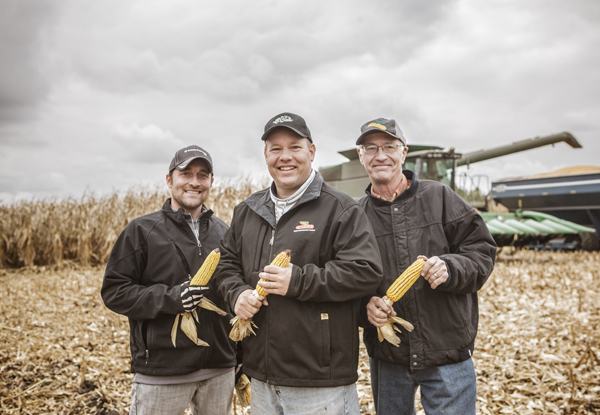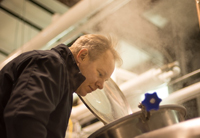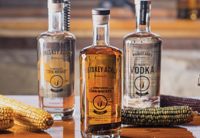
“Changing your mind-set from commodity production to producing a branded consumer product is a big shift for a farmer,” says Jamie Walter, CEO and president of Whiskey Acres.
That ability to change his mind-set a few times in life is what propelled Jamie into the award-winning seed-to-spirit distillery co-owner he is today.
“I’m a fifth-generation farmer,” he says. “But when I went off to college, I didn’t have the intention of going back to the farm.” Growing up on a family farm in DeKalb, Illinois, he shared the perspective of many young adults when leaving for the University of Illinois.
After receiving a bachelor of science degree in advertising and a juris doctorate in agricultural law from Drake University, Jamie joined a small private practice. But his career as an attorney wasn’t long for the making. After practicing law for a few years, the timing worked perfectly for Jamie to make a change in lifestyle and join his father’s successful farming operation. The Walter family began farming in the late 1800s in the Ohio River Valley. Jamie’s grandfather moved to DeKalb in the 1930s and started farming the land that Jamie and his father, Jim, farm today.
“My father is an award-winning master farmer, so the operation was already very successful when I returned,” Jamie explains. “But in 2000, when I became a full-time partner, we started bolting on new business to diversify production and operations.” Though they live only 60 miles west of Chicago, the third-largest metro center in the United States, the Walters had never tapped into the geographic potential. Jamie knew there was opportunity to be found in their proximity to urban interests.

© Image by Matthew Gilson
The Walters considered a number of different diversification options. They added a retail seed business, had a crop insurance agency, and took a strong interest in trying specialty products. From seed production, to food ingredients, to even a small side business making wine with grapes from California, they constantly tried new things.
The Walters even contemplated raising grapes themselves, but acknowledged that in DeKalb, Illinois, the land is best suited for row crops. Inspired by what they learned about beverage alcohol in the wine industry, they took a hard look at what the family had grown for years: corn.
The family wondered, “Could we take the grain we grow on our farm and turn it into a distilled product?
CUTTING THROUGH THE RED TAPE
Two years earlier, in 2010, Illinois passed a law allowing craft distillers to start operations in the state. Since whiskey is a distilled spirit made from a fermented grain mash, and bour¬bon is a type of whiskey that can only be made in the United States (with a minimum of 51 percent corn, among other characteristics), the Walters were on the right path.
“Those were the two triggers for us: We grew great corn and we could legally distill our own spirits,” Jamie says. “We focused our efforts on creating an on-farm craft distillery, making spirits with the grain we grow. Corn and rye whiskeys, vodka, etc., are all in our portfolio, but our focus is on bourbon whiskey.”
The Walters started with considerable research, attending weeklong distilling classes and conferences. They met Nick Nagele, who, with his marketing and sales experience, helped the Walters develop a viable business plan within about a year.
Amid the months of research, Jamie recalls, “We discovered whiskey is the fastest-growing spirits category in the world, and bourbon is the fastest-growing type of spirit in that category.”

© Image by Matthew Gilson
In 2013, the Walters and Nagele became business partners and incorporated Whiskey Acres Distilling Co. Once incorporated, but before they could begin distilling, they went through the lengthy process of obtaining federal and state licensing and permits. Without them, any form of beverage alcohol distillation is illegal. The company became fully functional in December 2014, and began production with an un-aged corn whiskey that hit shelves in February 2015.
FROM SEED TO SPIRIT
“We are functionally different than almost all other distillers in the U.S.,” Jamie says. “We are the second certified on-farm distillery in the country, according to the American Distilling Institute.”
The Walters grow No. 2 yellow dent corn, wheat and even rye for their spirits. And they have an advantage over other distillers. “With our background in seed, we understand the vast differences in corn varieties and the real effects on the grain itself,” Jamie explains.
Based on their experience in the wine industry, the Walters were familiar with the French concept of terroir, which means the characteristics of the soil and other environmental factors influence a crop and express themselves in the final product. Jamie notes that the land in France is aptly suited to produce cabernet sauvignon, chardonnay and pinot noir grapes, which become fine French wines. Similarly, the rich soil of DeKalb, Illinois, has proven itself for decades as premium land for growing corn. He believes that this terroir is reflected in the flavor profile of his family’s whiskey.
Working with a number of commercially available varieties, as well as a few heirloom varieties, the Walters make individual expressions of whiskey based on identity-preserved varieties of corn – similar to how different varietals of grapes make different types of wine. To complement their specific varieties of No. 2 yellow corn, they try to use different seeds including blue popcorn, heirloom corn from Mexico, and even sweet corn that they let mature to its grain stage, for different types of bourbon. “We haven’t released any of our bourbons yet, but we can already tell there are real qualitative differences in the flavor profiles,” Jamie says.
Currently, un-aged corn whiskey and 100 percent corn vodka are available across Illinois and online through retailers Whiskey Acres works with. Bourbon production takes more time due to the necessary aging process; the first batches of bourbon should be ready this summer – just in time for visitors to sample in the Whiskey Acres tasting room.
CONNECTING THE CITY TO THE FARM
For Nagele and the Walters, Whiskey Acres goes far beyond growing seed and producing distilled spirits. Visitors are encouraged to see the operation in action – from field, to tank, to bottle. “We take our guests out to the field, we talk about grain production, we walk them through the distillery, and we talk about the product manufacturing,” Jamie explains.
Benefiting from legislation that considers the Whiskey Acres tasting room, the completely remodeled historic dairy barn from the original farm, a “farm stand,” visitors can end their tour sampling spirits before heading home with their own bottles. It is at the farm stand that the Walters and Nagele have the opportunity to talk one-on-one with customers.
“A lot of guests from Chicago don’t have a strong background in farming – or in drinking whiskey,” Jamie says with a laugh. “We show them they don’t have to drink it straight or as a shot – we encourage them to drink it however they enjoy it.”
In the old dairy barn, while sampling craft cocktails with a whiskey base, visitors are also encouraged to ask questions to learn more about agriculture. “We’ve all seen the challenges with consumers not understanding what we do and why we do it,” Jamie says. “It’s important to be able to talk with them about biotechnology – why we use it on most, but not all, of our acres; about chemicals – why they are important and how we use them; about integrated pest management, environmental stewardship and all the things we manage on a commercial farm. We think having that conversation is very good for the health of our industry.”
Facilitating a conversation about modern agriculture has been one of the most rewarding aspects of establishing Whiskey Acres for Jamie. “We may not change their minds, but exposing consumers to what we’re doing and helping them think about what we do in a different way is one of the more rewarding things we do,” he asserts. It might not be best to bet against Jamie. After all, he’s shown a clear ability to think outside of the box, so mindset change seems to be in his makeup.
Perhaps it all came from “the willing partner in my father to change the way he thinks of farming,” Jamie says.
For more information on Whiskey Acres, visit www.whiskeyacres.com.